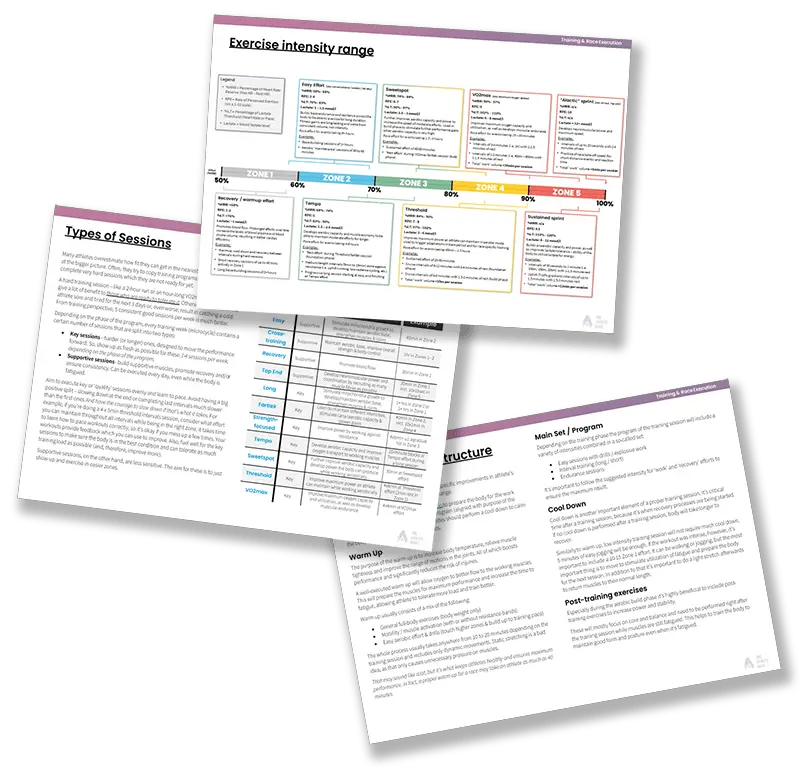High Heart Rate When Running? Here Are 11 Things You Can Do
In 2004, a study published by evolutionary biologist and Harvard professor Daniel Lieberman found that as humans we are actually incredibly adapted distance runners. Physiologically, we are built to be able to run after prey for hours (even in the heat) until the animal is completely exhausted and cannot fight back. That study has been nicknamed “Born to Run” and had a major influence on the running world. But if it’s true and we are born to run for hours, how come some of us struggle with high heart rate when running? Even at an easy pace.
Heart rate is a versatile metric and is particularly useful to control the training process. After all, it reflects all stress factors that affect the body on a particular day. Sleep quality, weather, impact of previous training, etc. Doesn’t matter whether we do an all-out sprint set or stay up late one night – our heart rate go wild the next morning. Which is why using heart rate training zones helps athletes ensure they are exercising at the right intensity. Given current condition.
If you’re looking for ways how to lower heart rate while running or wondering why is my heart rate high on easy runs you’re in the right place.
In this article, we will discuss:
- Why does heart rate increase during exercise
- Everyday factors that contribute to high heart rate when running
- “Why is my heart rate high on easy runs?”
- What happens when running heart rate stays too high for too long
- 11 Ways how to lower heart rate while running
Why does heart rate increase during exercise
Imagine you’re out on your interval session. It’s a hot summer day and you have 6x4min at threshold with 3min recovery ahead. No doubt, an intense session. After a warm-up, you take off, crushing the first interval. Then second and third. But before you start the fourth one you notice that heart rate didn’t drop to Zone 2. By your fifth interval, you’re struggling to make it through the recovery jog and switch to a walk instead. Interval pace keeps dropping and during the final interval the heart rate climbs way above the threshold effort. You feel completely exhausted.
It’s a very common situation athletes find themselves in. They focus on maintaining a certain pace/speed without taking into account other factors that affect the body. In this example the body needed to spend additional energy to cool itself off, which meant that it wasn’t in 100% condition to tolerate the interval session at the usual pace. While the first few intervals felt good and strong, the situation deteriorated towards the end of the session as heat and dehydration came into effect.

Our heart rate increases when the body undergoes more stress, because it has to deliver oxygen and nutrients to various areas of our body quicker. However, athletes with a more developed cardiovascular system (wider network of capillaries, higher stroke volume, more blood plasma volume) are able to do that more effectively. As a result, the blood doesn’t need to make that many circles around the cardiovascular system, which results in an overall lower heart rate.
That is also the reason why athletes’ resting heart rate is typically lower than that of regular people.
Everyday factors that contribute to high heart rate when running
Besides intensity of the exercise, running heart rate can be affected by a multitude of factors ranging from psychological to environmental:
- Heat & humidity
- Altitude
- Difficult terrain
- Dehydration
- Too much or uncomfortable clothing
- Lack of sleep
- Stress or worry
- Illness or use of medications
- Low glycogen / lack of nutrition
- General tiredness
Heart rate is the best indicator of the overall level of stress the body is going through in the moment.
Heart rate is an athlete’s best friend during and outside training, because it always tells the truth.
Recovery activities take place in the background and can continue for hours (or days) after the stress response took place. We can do a high intensity sprint set or go out partying with friends, the result will be the same – elevated resting heart rate the next morning. That is not a coincidence, but a reflection of how stressed the body is and how unprepared it would be for a hard training session.
“Why is my heart rate high on easy runs?”
So, high heart rate when running means the body experiences more stress and needs to pump blood quicker to handle the need for oxygen and nutrients. That is clear.
But how does that whole heart rate training work in practice? Why some athletes are able to run 1K in 5 minutes at heart rate of 130 and others – struggle at 180?
I’m glad you asked.
Reason 1: high heart rate when running due to individual physiology and incorrect heart rate zones
First of all, what is normal heart rate and what is high heart rate when running? Is 150 high? Or 180? Maybe 200?
Heart rate is an individual metric and what is considered high for one might be normal for another. Before worrying about why heart rate is high on easy runs, calculate your individual running heart rate zones. Those will be based on maximum heart rate and resting heart rate that are specific to you.
There are some people who are able to increase their heart rate only to 170bpm. Others might max out at 210bpm. What’s important is absolute values don’t mean anything and are just what a person is born with. What matters is the heart rate relative to that maximum, because it determines the intensity of the exercise.
During my competitive kayaking career I had a training partner with whom we used to compare heart rates. My maximum heart rate at the time was around 200 and his ~180. On any given session or interval our heart rates would differ by 10-20 beats, yet our race results were mere seconds apart. Even though my heart rate was overall higher, relative to maximum we were training at the similar intensity.
Read also: Heart Rate Training Zones – Complete Guide To Endurance Gains
If you have a higher maximum heart rate (say 190 or 200), your running heart rate zones will also be higher compared to someone who has a lower maximum heart rate. In that case, the fact that you have a high heart rate when running doesn’t necessarily mean it’s a problem. You do need to consult with a cardiologist and get a go-ahead from a physician to continue intense training, though. Athletes do such routine checks 1-2x per year.

FREE download
Heart Rate Zone & Intensity Cheat Sheet
Grab this FREE cheat sheet and learn the exact formula for building lasting fitness (includes a bonus aerobic base training plan AND 3 strength training to get you started).
Reason 2: high heart rate when running due to not adapted biomechanics
Another common reason why heart rate is high even on easy runs is that athlete’s physiology is not yet adapted. Muscles are not strong or resilient enough to handle the impact of running. The form is not efficient or optimized for running, which means other muscle groups need to compensate. Or the heart and cardiovascular system aren’t yet developed to the point when they can provide oxygen and nutrients quickly enough.
Simply put, your running form might not be optimal and, more importantly, there’s room to grow. An experienced runner can comfortably run a 10k in under 50 minutes as an easy training session. Someone without running background, though, will struggle with that.
As I look back at my running over the years, I see how I also struggled with high heart rate on my easy runs. And that is considering the fact that in kayaking I was competing at World & European Championship level. But over the years of building running endurance my easy pace went down to a point where I can comfortably cover a 10K in 45min at a conversational pace.
Read also: How To Build Running Endurance – 7 Science-Proven Methods
Reason 3: high heart rate when running due to fatigue
Next reason for a high heart rate when running (even on easy day) might sound obvious. Yet, surprisingly, many athletes still miss or don’t take it into account.
Fatigue – be it emotional or physical – can be deceiving. On one hand, it makes a person lethargic and robs him- or herself of energy to do something. On the other hand, when that person actually does something (like go for an easy run), that activity becomes more intense than expected.
For example, muscles take anywhere from 1 to 5 days to fully recover from an intense (or prolonged) activity. So, the heart rate would be elevated even on an easy run if that takes place while the body is still in recovery phase, low on glycogen or dehydrated. But that is ok, because easy running (Zones 1 – 2) promotes blood flow and speeds up the recovery process. Once muscles fully recover, the body will ‘supercompensate’ and grow stronger.
In the same way, emotional fatigue can result in higher heart rate when running as well. Stress at work, poor sleep, arguments with relatives. All these stress factors act like a few extra apps open on the phone. They’re not visible, but slowly draining the battery.

Reason 4: high heart rate when running due to challenging environment or terrain
High heart rate when running can also be a result of a hot day – like in the example above. The body has to spend extra effort to cool itself AND ensure muscle contraction to maintain running pace. Naturally, the heart rate will be elevated. Alternatively, high heart rate can be an effect of being at an altitude when concentration of oxygen in the blood is reduced.
Alternatively, you can be training on a tough terrain – rolling hills, packed snow or even dry sand (like I did when I trained for a marathon). In that case, your heart rate will be high regardless of whether that’s an easy run or not. That is because difficult terrain challenges our muscles more and in a different way. This means the body has to work harder than usual to keep going.

The Resilient Athlete
A Self-Coaching Guide to Next Level Performance in Sports & Life
Are you aiming to become a resilient athlete who is able to withstand any pressure? Be able to jump on any opportunity? Take any challenge life throws at you head on?
Then this book is for you.
Learn moreReason 5: high heart rate when running due to wrong intensity
Finally, what we consider to be easy in our head might not be easy for our body. The difference comes down to ego and pain threshold.
At a true easy effort, while lactate does start to accumulate (indicating muscle fatigue) it does so very slowly. Such intensity is low enough that a person is able to exercise for hours – 3, 4, 5 and even longer. When training for an Ironman, for example.
So, if during an easy session you can’t see yourself continuing for another few hours, your pace isn’t easy. And the fact that you have high heart rate when running is an indicator that you should slow down.
What happens when running heart rate stays too high for too long
The biggest medical concern about training at high heart rate is the potential damage to the heart muscle. The argument is that the heart spends too much time in hypoxic state and doesn’t get enough nutrients. This is NOT the case for healthy athletes. I explain it and the science behind heart rate training in video below:
The bottom line is, if you’re visiting a cardiologist and doing heart ultrasound on a regular basis, as well as your physician cleared you for intense exercise regimen, then high heart rate when running is not necessarily a bad thing.
However, even though running hard for extended period of time feels like a good exercise, it does not benefit aerobic development in the long term. You won’t train the aerobic energy system, if you consistently run your easy runs in Zone 3 and above (over 70% of your Heart Rate Reserve).
You will likely see quick improvements and maybe even enjoy slightly faster speed at shorter distance races (because you’re improving your lactic threshold). However, training too hard too often won’t allow you to recover enough to reap full benefits from such training. Eventually, running at a heart rate that’s too high for the purpose of your training will lead to a plateau in race times, burnout, or injury.
Read also: How To Use Polarized Training Model To Break Through Workout Plateau
11 Realistic strategies how to lower heart rate while running
We all want to enjoy running. But for some the challenge is to get to a point when you can run at a comfortable pace (and without stopping).
So, now that you know the reasons for your high heart rate when running, I’ll share the most effective ways how you can lower it.
Strategy #1: Switch run to run/walk or a ‘power hike’
If you have a high heart rate when running, the most effective thing you can do is to slow down. Reduce your intensity.
Taking walking breaks or even switching running to fast walking (power hiking) can help you catch your breath and allow the body to deliver oxygen-rich blood to the muscles more effectively. In the long-term this will also allow the body to adapt to the training load more effectively than running at your limit.
This is where you’ll need to forget about the ego and remember that it’s the low heart rate training that develops endurance – not high intensity. If all your runs are fast and at high heart rate, you’re not developing your engine that will let you lower heart rate while running.
Strategy #2: Invest time in base training
Speaking of low heart rate training, this particular strategy is not a quick fix but will provide the most significant and long-lasting effect.
Generally speaking, if you have a high heart rate when running easy, it means your cardiovascular system is not well-developed yet. And in order to develop it, you’ll need to spend considerable amount of time running at or around your aerobic threshold (Zone 2 and below) to build a so-called aerobic base.
Over time doing so will increase the heart’s stroke volume, widen capillary network and increase blood plasma volume, so that the body can better transport oxygen and nutrients to the muscles. Moreover, low intensity also improves mitochondrial density, which makes the body better at utilizing oxygen.
The share of low intensity (Zones 1 & 2) in the training plan should be no less than 80% of the total volume. More than 90% if you’re new to running. So, if you’re running 3 hours per week, no more than 36 minutes of those should be spent in Zones 3 – 5.
Read also: 4 Top Benefits Of Aerobic Base Training For Marathon Runners
Strategy #3: Switch running for less impactful cross-training
Running is a high-impact sport and every stride sends a force equal to 2-3x times our bodyweight (even more on downhill) through our body as we land – to muscles, ligaments and joints. Naturally, this also contributes to high heart rate when running.
To minimize this effect and gradually adapt to running, a good idea is to switch long running sessions for less shock-bearing activities. There are plenty of things you can do with your lower body for an extended period of time which will help to build endurance without a significant impact on the body. Cycling, hiking, rucking, rowing and even stair climbing. Choose what you fancy and for the best aerobic benefit aim to spend extended amount of time (1.5+ hrs) in Zones 1 – 2.
Strategy #4: Split your runs
For many athletes heart rate doesn’t jump from normal to high the moment they start running. Instead, it gradually climbs throughout the run.
This effect is sometimes referred to as cardiac drift. After some point the heart rate gradually increases even though the pace remains the same. It’s more pronounced on longer runs with durations over 45 minutes. All it does is reflect how the body gradually becomes tired. Be it muscle fatigue from maintaining the same pace for extended period or time, running low on glycogen or even the effect of hot weather.
Either way, that cardiac drift is also the indicator of a training effect that is taking place. The best way to go around it is to split the training into shorter but more frequent sessions (for example, split 1hr run into two 30min sessions). That way the body will be able to tolerate the training load better and recover quicker for the next session.
Strategy #5: Run in the morning to stay cool
If you’re living in a hot climate or in a place where summer is particularly hot, then high heart rate when running might be caused by the body trying hard to cool itself off. In such cases, running in the middle of the day (when the sun is high and very active) impacts everyone. Even more experienced ones who are better at thermoregulation (they sweat more and start sweating earlier).
Generally, athletes can feel the effect of heat when exercising in temperatures over 25°C (77°F) for longer than 30 minutes. In such cases, training early in the morning can be an easy way how to lower heart rate when running. Running in the afternoon can also be a good option (because the weather is cooler then), but only if it’s not after a stressful day which will result in a higher heart rate.
Strategy #6: Choose your terrain and surface
Another easy way to lower heart rate while running is to avoid running on particularly challenging or hilly terrain. For example, try to avoid:
- Beach – running on sand is harder because the energy is absorbed in the surface and is not ‘bouncing back’. Especially on dry sand when feet are sliding on every step.
- Packed snow or icy road – running is challenging because the feet are very unstable and slide on every step.
- Concrete surface – running produces additional stress on the joints because the energy is not absorbed in the surface. This results in more muscle damage.
- Hills – running is harder because the body needs to produce more force to move forward (and upward).
Try to choose flat terrain for your runs which is not too soft or too hard. Best would be packed dirt (trail) or tarmac (road). Choosing a road that is slightly downhill can help to lower heart rate while running (gravity will take over some work). And, of course, you know how hard it is to run against headwind, so try to plan your route to minimize it.

Strategy #7: Reduce ‘digestive’ stress
If we go for a run shortly after eating a meal, the body will have hard time moving blood to our stomach (to digest food) AND to our muscles (to exercise). So, the cardiovascular system will need to make more circles around the body causing the heart rate to increase. The same applies when we’re fasted (having not eaten for 8+ hours), at altitude, fighting a cold (or any other illness), feel tired and so on. It’s like our phones – when there are multiple ‘apps’ running, the body needs more energy and works harder to get it.
So, just like when we want to minimize muscle soreness or bounce back quicker after a training or a race, the less energy we waste on dealing with stress factors, the more we can use for performance & recovery.
One of the biggest stress factors is, in fact, poor nutrition choices. Heavy, processed and sugary foods place a lot of stress on our digestive system. Nor these are the most efficient way how to nourish a high-performing engine. Try to avoid these and instead look for nutrient-dense foods that provide the body with vitamins & minerals – not only macro-nutrients (protein, carbs & fat).
Read also: Top 10 Endurance Athlete Diet Mistakes And How To Avoid Them
Strategy #8: Come fresh for the training session
While nutrition is important, there are more at stake than just that. Keep in mind that a lot of factors affect our body. So, if you want to lower your heart rate while running (especially on your key runs), make sure you’re minimizing all possible stress factors. That includes:
- Rest – get enough quality sleep every night (at least 8 hours)
- Hydration – drink enough water and electrolytes – sodium, chloride, potassium, magnesium, calcium and phosphorus. These help to ensure the optimal functioning of the body.
- Carb-loading – consume an increased amount of carbs in the previous day to replenish glycogen reserves that were taxed by previous hard or extensive training
- Recovery days – include active rest days or recovery workouts to reduce lactate build-up
- Warm up – perform dynamic movements to relieve muscle tightness and improve the range of motion in the joints.
- Mobility – get into a practice of actively looking for and relieving tightness throughout the body in between the training sessions. Be it by spending 10 minutes foam rolling or just following a yoga sequence on YouTube.
Strategy #9: Avoid stimulants before a run
Stimulants like caffeine, guarana, alcohol, nicotine and others have a lot of different effects on our bodies. The most import one is that those substances are, essentially, toxins. And, as with any toxin, the body fights hard to process it and get rid of it. This, naturally, requires additional energy.
That can contribute to dehydration, which can put additional pressure on the cardiovascular system.
If you feel you can’t function without your morning cup of coffee before your run, make sure you rehydrate by drinking a large cup of water (250ml or 8 ounces) before you leave and the same amount every 30 minutes during your run.

Strategy #10: Learn to run relaxed
Studies show that stress affects our autonomic nervous system. In particular, it increases the activity of sympathetic nervous system (fight or flight) and decreases the activity of parasympathetic nervous system (rest & digest). More importantly, though, it has also been proven that emotions result in altered autonomic nervous system activity. This essentially means that our thought patterns and emotional responses to those are directly reflected in our heart rate.
Try it out – think for 1km about something very stressful, exciting, crazy, something that gets the mind rushing. Like a deadline you have to meet this night and you don’t have everything ready. And for the next 1km think of something very relaxing, like a mindfulness or a yoga retreat somewhere peaceful. You’ll notice your heart rate will differ at the same pace (by as much as 20bpm).
Our psychological situation impacts our heart rate a lot, so learning to ‘run relaxed’ (trough breathing and focusing) is a very handy skill to master.
Try to refocus your attention on something relaxing when you run and breathe systematically. Inhale through the nose and exhale through the mouth.
If you feel your heart rate is too high, stop running (or find a place to sit down) and try belly breathing. Breathe deeply through your nose until your belly expands, then exhale through your nose or mouth. Repeat until your heart rate has slowed.
Strategy #11: Vary your training
Finally, one important factor that contributes to high heart rate when running is muscle economy. In particular, how conditioned the body is at using certain muscle groups in a specific way. Athletes with inefficient form or not adapted biomechanics (weak stabilizers, muscle imbalance, etc.) cannot produce as much force as they could. As a result, the heart rate will be higher.
There are a few ways to improve running economy:
Faster running promotes good running form and activation of posterior chain muscles – hamstrings and glutes. To start with, add a few strides (20-30sec accelerations to nearly top speed) after an easy run. Or, better yet, do a fartlek session (i.e. 10x30sec at 5K to 10K pace) once a week. The body adapts quickly to faster running. You might even notice that 1-2 days following such a session it feels a little easier to run.
Uphill running puts the body in a more efficient position against the ground (slight forward lean). This promotes good running form and activation of posterior chain. In the beginning of the season it’s a very good idea to include long hill repeats (i.e. 6x3min in Zone 3 at 3-5% grade) to improve running economy.
Strength training is an efficient way how to improve running economy and over time lower heart rate while running. In particular, it helps to develop strength in run-specific muscle groups and do so without the detrimental effect of additional volume. Include 1-2 strength sessions per week focusing on strength of prime movers and core.
Read also: 12 Effective Strength Building Workouts For Any Experience Level
Have an opinion? Share via links below and tag @theathleteblog
Tags In
Andrejs Birjukovs
GET A FREE TRAINING PLAN
Subscribe to my email list and get access to a free 4-week “back in shape” training plan
You’ll also get two full-body strength sessions and some other goodies!

How did I get here?
Hey there! My name is Andrejs and I am here to inspire, entertain and get you fit for any adventure.
I went from being an over trained pro athlete to an endurance coach sharing how to listen to your body and live life to the fullest.
Traveling, new sports & activities brought new meaning to my training and made it much more effective, fun and enjoyable. And I'm here to help you do the same.


